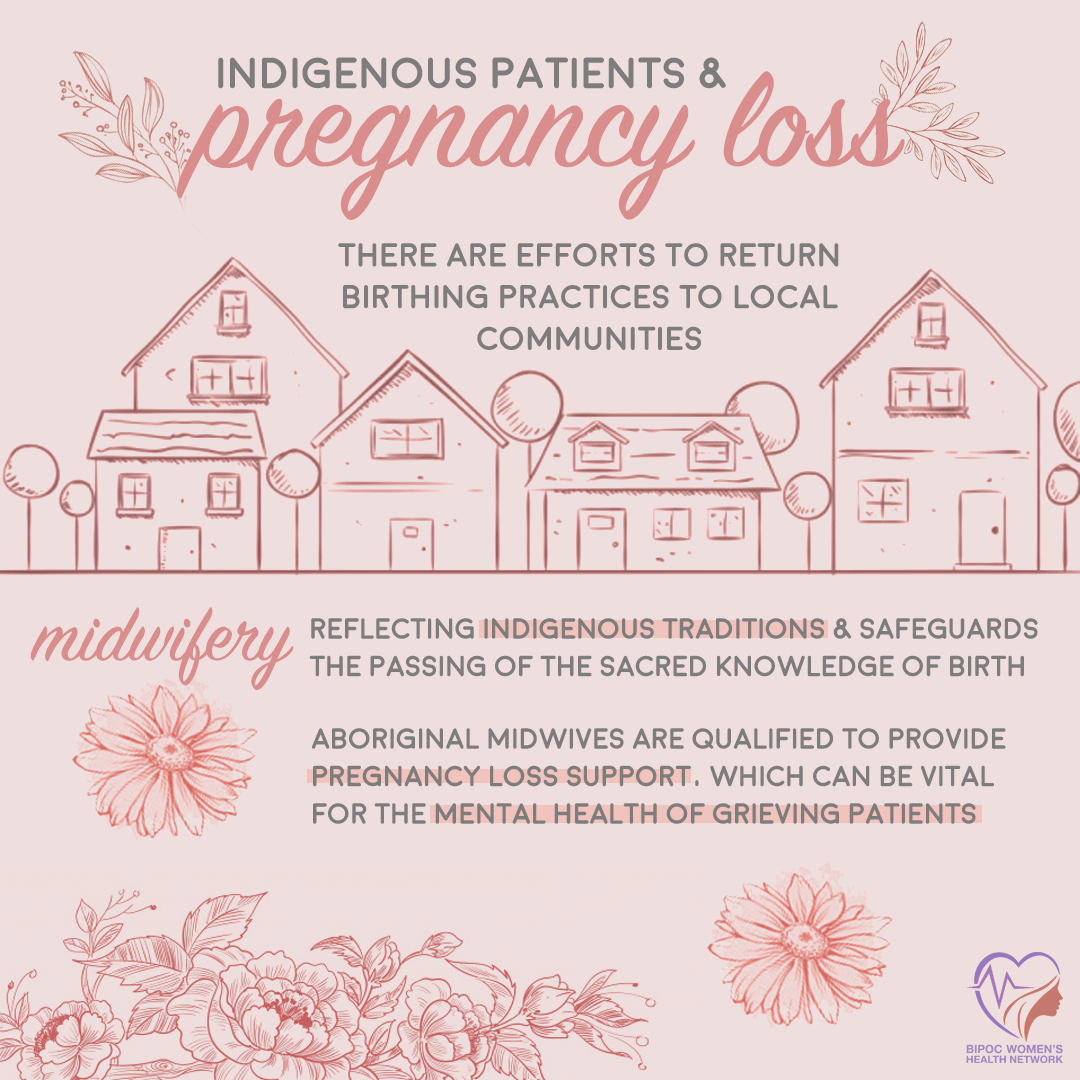



1. A 2004 report showed that in Indigenous populations, stillbirth and perinatal mortality rates were 2 times higher than the Canadian average.1 The stillbirth and perinatal mortality rate among Inuit in the Northwest Territories were 5 times higher than the Canadian average.1 Thus, despite Canada having high quality perinatal care overall and a low perinatal mortality rate in comparison with other countries, there exists a care discrepancy between Indigenous and non-Indigenous Canadians that should be addressed.
2. Differences in pregnancy loss rates may reflect health disparities for Indigenous populations. This includes insufficient access to healthcare providers, and particularly to Indigenous healthcare providers who can offer patients culturally-relevant services.2 Patients may not trust healthcare providers due to systemic discrimination and colonial history. Regional barriers for patients in remote communities can also limit access to needed healthcare services.2
“Perinatal” refers to the period of time before and after birth.

3. A significant proportion of rural communities are Indigenous, and they often must leave their communities to give birth, which can lead to care that is not culturally-competent and without the physical support of family and community members.3 This process disrupts the traditional practice of giving birth within the community and receiving bereavement support in the event of pregnancy loss. There have been efforts to return birthing practices to local communities when a pregnancy is low-risk.
4. Midwifery reflects Indigenous traditions and safeguards the passing of the sacred knowledge of birth.2 Colonialism has impeded the prevalence and delivery of traditional midwifery services but since 1994 Ontario legislation, there has been a re-emergence of Aboriginal midwifery that honours tradition.2,4 Aboriginal midwives are qualified to provide pregnancy loss support, which can be vital for the mental health of grieving patients.
“Traditionally, birth was viewed not only as Creation’s addition to the family and community, but as a reinforcement of relationship to the land, as a strengthening of cultural relationships, and as a way to teach and transfer knowledge to the younger people involved in helping out at birthings.”2
— Native Women’s Association of Canada
5. Cultural safety extends the power of cultural competence by recognizing its limitations.5 While cultural competence is important, it focuses on the skills, knowledge, and attitudes of healthcare providers. Cultural safety involves building trusting and respectful partnerships between provider and patient. Cultural safety also requires the awareness that a healthcare provider has power over the patient and that these power discrepancies are at play during healthcare delivery. Indigenous patients may face healthcare providers who do not provide full information in plain language regarding the recommended treatments and medications as well as the possible side effects and risks.2 Fully informed consent is necessary to enable the patient to make individual and autonomous decisions about their care.

Supports
General
- “What God Is Honored Here?: Writings on Miscarriage and Infant Loss by and for Native Women and Women of Color” by Shannon Gibney and Kao Kalia Yang
Yukon
- First Nations Patient Support Services for hospital care: 867-393-8780
- Reach Out Support Line: 1-844-533-3030
Alberta
- Government of Alberta notes that health care team includes an Aboriginal hospital liaison worker
- Indigenous Birth of Alberta has Doulas with experience in pregnancy loss support
- Government of Alberta
- Pregnancy and Infant Loss – Grief Support (Foothills Medical Centre): 403-944-2274
- Pregnancy Loss Supports in Calgary, Red Deer, Edmonton
- Mental Health Help Line: 1-877-303-2642
Saskatchewan
- Bearing Loss Support Group: 306-766-2384 to register
- HealthLine 811 (24/7) health and mental health, education and support line: dial 811 or 1-877-800-0002
Manitoba
- Klinic Crisis Line (24/7): 204-786-8686 | 1-888-322-3019
Ontario
- Ontario’s Aboriginal Health Access Centres (10 locations)
-
- Programs and services are designed and delivered by Aboriginal people with the aim of healing intergenerational trauma
- Provides culturally-appropriate healthcare with a focus on tradition, healing, and wellness
-
- Aboriginal Midwifery (Southwest Ontario Aboriginal Health Access Centre)
-
- 519-672 –4079 or 1-877-454-0753
- Services currently available in London, the communities of Chippewas of the Thames, Oneida Nation of the Thames, and Munsee-Delaware Nation, and the surrounding rural regions.
- Services include pregnancy loss support
-
New Brunswick
-
Chimo Helpline (24/7): 1-800-667-5005
Nova Scotia
- Eskasoni Mental Health Services for the Mi’kmaq community: 1-855-379-2099
- Provincial Mental Health and Addictions Crisis Line: 1-888-429-8167
Prince Edward Island
- Native Council of Prince Edward Island (does not support pregnancy loss / grief counseling specifically)
- Island Helpline (24/7): 1-800-218-2885
- Women’s Wellness Program: pregnancy loss counseling 1-844-365-8258 to make an appointment
Newfoundland & Labrador
- Provincial Mental Health Crisis Line: 1-888-737-4668 or 709-737-4668
Author | Mathura Thiyagarajah
References
- Chalmers, B., & Wen, S. W. (2004). Perinatal care in Canada. BMC Women’s Health, 4(1), 1-5.
- Native Women‘s Association of Canada (June 2007). Aboriginal Women and Reproductive Health, Midwifery, and Birthing Centres. An Issue Paper. Prepared for the National Aboriginal Women‘s Summit, Corner Brook, NL.
- Kolahdooz, F., Launier, K., Nader, F., Yi, K. J., Baker, P., McHugh, T. L., … & Sharma, S. (2016). Canadian Indigenous women’s perspectives of maternal health and health care services: A systematic review. Divers Equal Health Care, 13(5), 334-48.
- Bourgeault, I. L., Benoit, C., & Davis-Floyd, R. (2004). Reconceiving midwifery. McGill-Queen’s Press-MQUP.
- Di Lallo, S. (2014). Prenatal care through the eyes of Canadian Aboriginal women. Nursing for women’s health, 18(1), 38-46.
